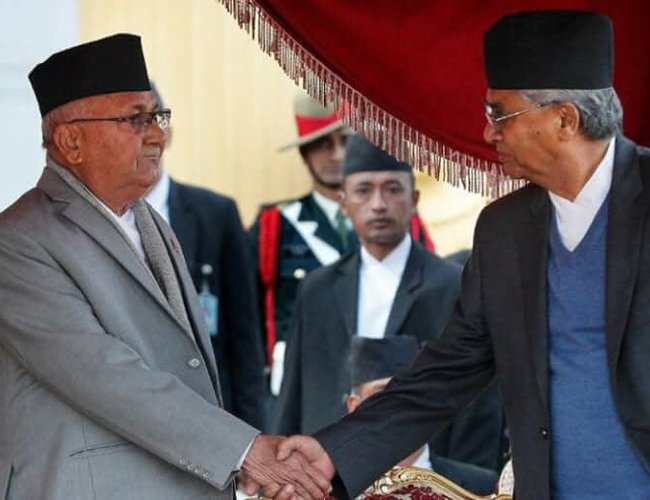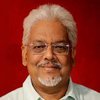
On June 1, while Nepal slept, at midnight two septuagenarian leaders, Deuba (78) leader of the Nepali Congress (NC) and Oli (72), leader of the Nepal Communist Party (United Marxist Leninist), or UML, met at a businessman’s residence in Kathmandu and planned a political coup against Prachanda. The two ideologically divergent parties came to a seven-point agreement to form a new government led by Oli for one-and-a-half years and then by Deuba for the remainder three-and-a-half year term of the lower house of parliament.
Since the December 2022 election, Prachanda has managed to hold on to the post of prime minister by manipulating each of the two larger parties in turn despite his Communist Party of Nepal (Maoist Centre) winning only 32 of the 275 directly elected seats in 2022. His pre-poll ally, the Nepali Congress, did better than expected securing 89 directly contested seats. So, to ensure his premiership, Prachanda broke the alliance with the Nepali Congress and formed a coalition government with Oli whose party won 78 seats. Just two months later, in February 2023, Prachanda broke the ruling alliance by supporting the NC’s candidate for President of Nepal. A coalition government with the NC and other smaller parties was stitched together with the prime ministership to be shared with Deuba. This March, the coalition was being torn apart by internal differences, especially because of the economic policies of Finance Minister Prakash Sharan Mahat, an NC nominee to Prachanda’s Cabinet.
Prachanda also did not back the NC’s nominee for the post of Chairman of the upper house. With disagreements growing, Prachanda tried to safeguard his term by ditching the NC and realigning with the UML. Despite the general impression that India was blindsided by these developments, the reality is more complex. Till a week ago, political observers in Nepal believed that India was trying to persuade Prachanda to oust Oli’s UML and bring Debua's Nepali Congress into the ruling alliance.
While there is no obvious confirmation of such a move by India, two recent incidents seem significant. On June 29, Bechan Jha, one of the main accused in the fake Bhutanese refugee scandal (where Nepali citizens were being sent on fake papers as Bhutanese refugees to the US) was arrested ostensibly from Kanchanpur on the India-Nepal border. Speculation is that the Indian police played some role in this. The second development was the arrest of Prateek Thapa, on June 28, from Kathmandu in the same case.
He is the son of former Home Minister Ram Bahadur Thapa Badal of Oli’s UML. Jha’s arrest could have given leverage to Prachanda over Deuba as the refugee scandal is also believed to be linked to the high-profile spouse of a prominent NC leader. Many political bigwigs from the NC and the UML have been arrested and charged in the fake refugee scandal, including a former Deputy Prime Minister and a former Home Minister. The arrest of Prateek Thapa was then another warning shot for Oli and the UML. If Prachanda indeed planned to bargain with these counters, on his own or on the advice of others, it backfired, when Deuba joined forces with Oli. An important factor in drawing outside forces into the Nepalese political mire may also have been the Prachanda government’s plan to sign the implementation plan for the Belt and Road Initiative (BRI) agreement signed with China in 2017. The implantation agreement was to be signed during Chinese Vice Minister for Foreign Affairs, Sun Weidong’s visit to Kathmandu on June 25. But at the last minute, Prachanda held back.
Prachanda’s reluctance to sign the BRI implementation plan was apparently the result of India’s pressure. The US is also opposed to it. The NC’s Central Working Committee (Mahasamiti) also passed a resolution on July 2 that Nepal should only accept grants from China and not loans for the BRI projects. With a UML-NC government likely to come to power, Nepal is unlikely to implement the BRI with commercial interest rates being charged by China.
While Oli is in favour of implementing the BRI, he may not be willing to put his leadership of the government at risk, in the light of the NC’s resolution. The important question is whether the musical chairs in Nepal will continue, or will its polity stabilise now? The two new coalition partners, the UML and the NC, are looking at changing the electoral system to stabilise the political system.
At present it includes seats by direct elections, but also some by proportionate representation. The UML and the NC, which together have the two-thirds majority to amend the Constitution, want to do away with proportional representation in the lower house, limiting it to directly elected MPs, to Deuba have agreed to form a high-powered committee, likely to be headed by former Chief Justice of Nepal Justice Kalyan Shreshtha, to suggest the amendments.
However, once the process of amending the constitution begins, it may not be limited only to the electoral system. Pressure groups from the Madhesis (residents of Nepal’s Terai) or those supporting Nepal’s return to a Hindu State, will once again get active. Already there is speculation that the Madhesis may get special privileges for a limited period in some specified job categories.
Although India’s alleged attempt to re-tie the knot between Prachanda and Deuba has failed, it seems to have accepted the outcome of the latest round of musical chairs where Oli comes out on top. Perhaps, New Delhi hopes that with Deuba and the NC in the game, it will still have a friend in the government.
(Bharat Bhushan is a Delhi-based journalist.) Disclaimer: The views expressed above are the author's own. They do not necessarily reflect the views of New Spotlight.













